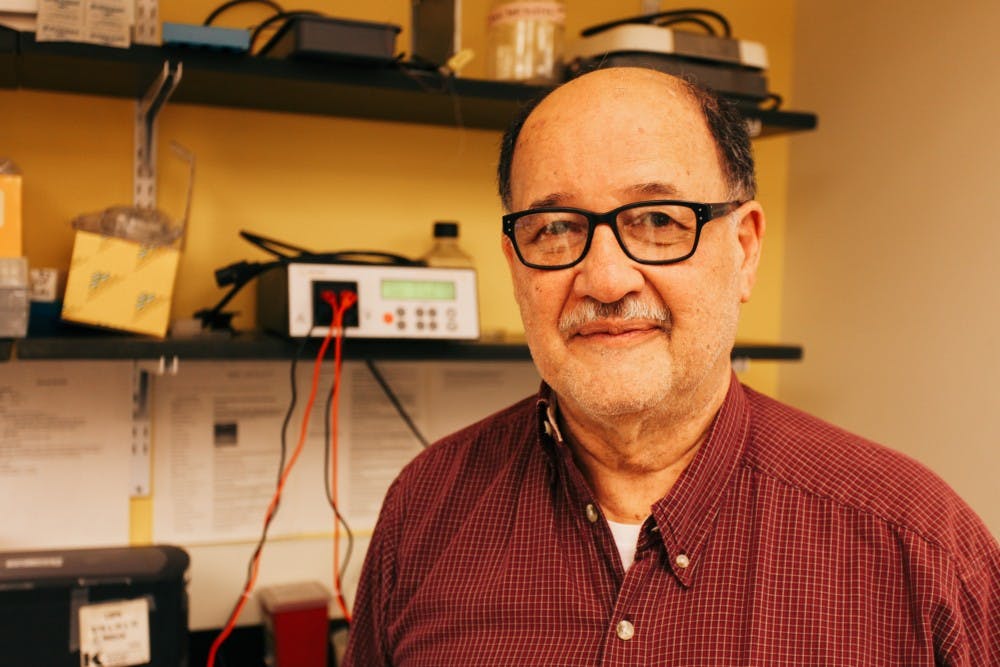Something that immediately stands out when you speak to Kings Court English House (KCECH) Faculty Director Dr. Jorge Santiago-Aviles is his intense love of gardening.
“We’re going to have apples, and we’re going to have peaches, and we’re going to have cherries, and we’re going to have apricots,” he says to me warmly, gesturing outside to the KCECH courtyard.
Although it’s currently snowing outside, I can imagine the bare trees flowering and fruiting in spring.
“And then you’re going to see birds, and then the squirrels all around. It’s wonderful for living in a city,” he says, laughing. “We have a wonderful oasis here.”
A professor of electrical and systems engineering, Dr. Santiago-Aviles spends a lot of time researching and lecturing about supercapacitors—powerful capacitors that store and release energy at a much quicker rate than batteries. This doesn’t seem like it relates all that much to his love of nature or his job as faculty director, but for him, science is the glue that binds all of his other passions together.
In his first year of college in Puerto Rico, he met a physics professor whose teaching inspired his scientific curiosity.
“She saw physics so clearly, and her explanations were so persuasive,” he says. “And I thought, oh, my God, physics must be such a wonderful, wonderful thing. She is my hero.”
Four years later, he graduated with a bachelor's degree in Physics from the University of Puerto Rico and a doctorate in Materials Science and Engineering from Pennsylvania State University.
Hoping to support his family and make a difference in the world, Dr. Santiago-Aviles decided to become an engineer, focusing on how to bring human energy consumption into the future. He believes that humans will need to rely on electrical energy to curb the negative effects of climate change. He believes improving the efficiency of supercapacitors is a promising path to securing an environmentally sustainable future.
Working at Penn in the 1980s gave him the opportunity to turn his love for STEM and environmentalism into real change for students. He learned that the staff at KCECH were interested in starting a science residential program, so when he was offered the position, he took it and began to work on the program right away. The project eventually became known as STWing, the Science and Technology Wing, a program that has been on the cutting edge of Penn STEM for more than 20 years.
According to Dr. Santiago-Aviles, one of the first computer servers Penn owned had its home in STWing. Members of the program currently host Penn Course Review and maintain the courtyard through the KCECH Gardening Club, whose efforts have earned them three awards from the Pennsylvania Horticultural Society.
Since the inception of STWing, Dr. Santiago-Aviles has worked with other campus leaders to introduce residential programs in a variety of fields. As of today, KCECH houses STWing, Biosphere, the Huntsman Program, Perspectives in Humanities, and Women in Computer Science.
Although Dr. Santiago-Aviles has been instrumental in making KCECH a special community, he made sure to stress that the residential programs and visiting speakers couldn’t have been successful without the work of other faculty, including the house dean, house coordinator, and countless RAs and GAs who have worked in the building over the years. And the best part of KCECH? “You guys,” he says, referring to the students.
Dr. Santiago-Aviles will be retiring from his faculty director position next year to write and travel, ending his decades–long career at KCECH. But the impact of his work in STEM (and his lovely courtyard garden) will stay with the college house for years to come.







